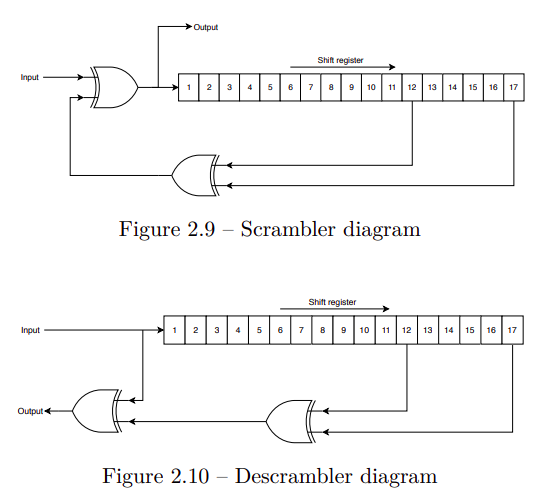I have written and tested a G3RUH (1 + X^12 + X^17) descrambler. It seems to work quite well in an SDR project I'm working on. I'm currently working on a scrambler and I can't get it to work. Below is the test code I use. It has scrambling, descrambling, data-generating, and error testing functions. I was wondering if you could spot what I'm doing wrong.

#include <iostream>
#include <vector>
#include <cassert>
using namespace std;
void
Scramble(std::vector<uint8_t> &u8vIn)
{
uint32_t m_nLSR = 0;
uint8_t bit;
std::vector<uint8_t> buffer(u8vIn.size());
for(unsigned int i = 0; i < u8vIn.size(); i++)
{
bit = u8vIn[i]^((m_nLSR >> 12) & 1)^((m_nLSR >> 17) & 1);
m_nLSR = (m_nLSR << 1) | bit;
buffer[i] = bit;
}
u8vIn.clear();
u8vIn = buffer;
}
void
Descramble(std::vector<uint8_t> &u8vIn)
{
uint32_t m_nLSR = 0;
uint8_t bit;
std::vector<uint8_t> buffer(u8vIn.size());
for(unsigned int i = 0; i < u8vIn.size(); i++)
{
bit = (m_nLSR & 1)^((m_nLSR >> 12) & 1)^((m_nLSR >> 17) & 1);
m_nLSR = (m_nLSR << 1) | u8vIn[i];
buffer[i] = bit;
}
u8vIn.clear();
u8vIn = buffer;
}
void
GenRand(int nLength, std::vector<uint8_t> &u8vIn)
{
// PRBS 7 : x^7 + x^6 + 1
uint8_t nPRBS7Start = 0x7f;
uint8_t nPRBS7Out = nPRBS7Start;
for(int i = 0; i < nLength; i++)
{
uint8_t newbit = (((nPRBS7Out >> 6) ^ (nPRBS7Out >> 5)) & 1);
nPRBS7Out = ((nPRBS7Out << 1) | newbit) & 0x7f;
u8vIn.push_back(newbit);
}
}
int
Bert(std::vector<uint8_t> u8Seq1, std::vector<uint8_t> u8Seq2)
{
assert(u8Seq1.size() == u8Seq2.size());
int errors = 0;
for(unsigned int i = 0; i < u8Seq1.size(); i++)
errors += u8Seq1[i]^u8Seq2[i] ? 1:0;
return errors;
}
int main()
{
// Generate random data
std::vector<uint8_t> prbs, buff;
GenRand(128,prbs);
buff = prbs;
// G3RUH Scrambling
Scramble(prbs);
// G3RUH Descrambling
Descramble(prbs);
// BERT
int errors = Bert(buff,prbs);
cout << "NumErrors=" << errors<< endl;
return 0;
}
